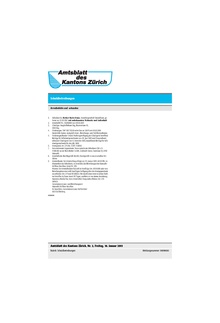Arrest (civil process)
In the Swiss SchKG and in German civil procedure law, arrest is a measure to secure future foreclosure due to a monetary claim .
Germany
The arrest serves the temporary legal protection of the obligee of a monetary claim or because of a claim that can turn into a monetary claim. Any property claim can turn into a monetary claim by turning into a monetary claim for damages in the event of non-fulfillment .
It is regulated in § § 916 to § 934 of the Code of Civil Procedure (ZPO). The arrest is ordered by the competent arrest court ( § 919 ZPO) in a special investigation procedure , the arrest process , in the case of an oral hearing by final judgment , otherwise by resolution . If another claim is to be secured, which is not a monetary claim or which cannot be converted into such a claim, an interim injunction is permissible instead of the attachment ( § 935 , § 940 ZPO).
A distinction is made between arrest in rem , which consists of the confiscation of individual assets of the debtor, and personal arrest by restricting the debtor's freedom of movement (personal security arrest ).
The arrest warrant is executed upon renewed application by the obligee by the competent enforcement body ( § 928 ZPO), the arrest in rem by seizure ( § 930 ZPO), personal arrest by imprisonment or other restriction of personal freedom ( § 933 ZPO).
The execution of the attachment can be averted by depositing a certain amount of money ( § 923 , § 934 ZPO).
Switzerland
In Switzerland , arrest is regulated in Art. 271 ff. SchKG .
This securing means is independent of the bankruptcy ability of the debtor permitted.
The arrest is granted in a super-temporary arrangement. In arrest proceedings, there is basically a limitation of the severity of evidence (substantiation); the proof of the process requirements is excluded. The factual responsibility is determined by the cantonal legislators .
The following defense options exist in particular in the attachment proceedings:
- Objection to the arrest order (Art. 278 DEBA)
- Claim for damages (Art. 273 SchKG)
- Complaint (Art. 17 SchKG)
- Opposition proceedings (Art. 106 ff. SchKG)
The causal liability according to Art. 273 para. 1 DEBA of the attaching creditor does not apply in the event of an inadequate execution of the attachment.
An important advantage and an important area of application of arrest is the so-called foreigner arrest (Article 271 Paragraph 1 Number 5 DEBA) in conjunction with Article 4 PILA . This enables a creditor to arrest the assets of a foreign debtor (seen from Switzerland) located in Switzerland and then to bring proceedings in Switzerland (at the so-called place of jurisdiction of the place of arrest according to Article 4 IPRG); whereby, according to the Swiss view, the assets of a debtor domiciled abroad are located where his debtor is located (for example, assets that a Canadian has in a Swiss bank account are located at the location of this bank), which extends the scope of this rule.
However, if the debtor is resident in a contracting state to the Lugano Convention , the place of arrest is an exorbitant place of jurisdiction. The arrest of a resident of a “Lugano state” is then possible, but the place of jurisdiction stipulated in the Lugano Convention applies to the corresponding legal proceedings (“pro-sequencing”) that the creditor initiates.
Web links
Individual evidence
- ↑ Lecture ZPO II. Part II: Temporary legal protection University of Würzburg (no year), accessed on September 25, 2019
- ↑ Hunziker / Pellascio, p. 366
- ↑ Hunziker / Pellascio, p. 293
- ↑ Hunziker / Pellascio, p. 292 f.
- ↑ Hunziker / Pellascio, p. 298
- ↑ cf. on this Hunziker / Pellascio, p. 298 ff.
- ↑ cf. on this Hunziker / Pellascio, p. 302 f.
- ↑ cf. on this Hunziker / Pellascio, p. 13 ff.
- ↑ cf. on this Hunziker / Pellascio, p. 106 ff.
- ↑ BGE 113 III 94, 99; Hunziker / Pellascio, p. 302
